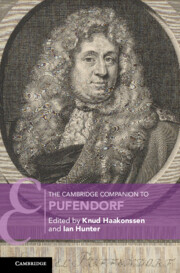Book contents
- The Cambridge Companion to Pufendorf
- Cambridge Companions to Law
- The Cambridge Companion to Pufendorf
- Copyright page
- Contents
- Contributors
- Abbreviations
- 1 Introduction: Life, Work and Historical Context
- 2 Politics and the Constitution of the Empire
- 3 Pufendorf’s Composite Method
- 4 The Metaphysics of Moral Entities
- 5 Human Nature, the State of Nature and Natural Law
- 6 Pacts, Language and Property
- 7 Family and Marriage
- 8 Pacts, Sovereignty and Forms of Government
- 9 The Civil Order: Law, Punishment and Social Value
- 10 The Law of Nations
- 11 Polemics and Controversies: Regarding the Eris Scandica
- 12 State, Church, Toleration, Reconciliation
- 13 Political Histories
- 14 Receptions, Contestations and Confusions
- Bibliography
- Index
11 - Polemics and Controversies: Regarding the Eris Scandica
Published online by Cambridge University Press: 25 November 2022
- The Cambridge Companion to Pufendorf
- Cambridge Companions to Law
- The Cambridge Companion to Pufendorf
- Copyright page
- Contents
- Contributors
- Abbreviations
- 1 Introduction: Life, Work and Historical Context
- 2 Politics and the Constitution of the Empire
- 3 Pufendorf’s Composite Method
- 4 The Metaphysics of Moral Entities
- 5 Human Nature, the State of Nature and Natural Law
- 6 Pacts, Language and Property
- 7 Family and Marriage
- 8 Pacts, Sovereignty and Forms of Government
- 9 The Civil Order: Law, Punishment and Social Value
- 10 The Law of Nations
- 11 Polemics and Controversies: Regarding the Eris Scandica
- 12 State, Church, Toleration, Reconciliation
- 13 Political Histories
- 14 Receptions, Contestations and Confusions
- Bibliography
- Index
Summary
This chapter discusses the polemical works that Pufendorf wrote in response to the violent criticisms directed against his main natural law work, the Law of Nature and Nations. Pufendorf collected these controversial writings under the title Eris Scandica (Scandinavian dispute) in 1686. Despite being indispensable for the reconstruction of Pufendorf’s thought, and notwithstanding its great success among his contemporaries, this work is one of the least known and used works by scholars of natural law. In beginning to make good this deficit the present chapter offers insights not only into the philosophical arguments of our author, but also into his formidable satirical style, at once strongly contentious and imaginative. Much of the ferocity of the disputes is explained by the fact that Pufendorf’s enemies were actually accusing him of heresy, which helps to clarify the centrality of the work’s philosophical-theological themes and the violence of Pufendorf’s reaction. In presenting the variety of philosophical issues covered in Eris Scandica, the chapter covers not only the classic themes of natural law—state of nature, moral entities, obligation—but also elucidates Pufendorf’s views of the relation between philosophical reason and Christian philosophy, thence philosophy and theology, and his stance towards Cartesianism.
Keywords
- Type
- Chapter
- Information
- The Cambridge Companion to Pufendorf , pp. 263 - 294Publisher: Cambridge University PressPrint publication year: 2022

